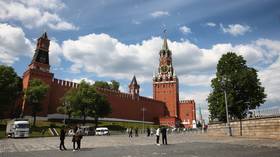
Ukraine had previously demanded that the West hand over all of Moscow’s sanctioned funds, not just the interest received

© Getty Images / Andrii Yalanskyi
France, Germany, Italy and Belgium have told the European Commission that they would prefer not to push forward with using profits from sanctioned Russian central bank assets to support Ukraine, Bloomberg reported on Thursday, citing people familiar with the matter.
The member states would rather opt for a more gradual approach when it comes to the issue of Russian assets that were frozen as part of Ukraine-related sanctions imposed on Russia in 2022.
The comments were reportedly made during a closed-door meeting earlier this week, as the bloc’s executive arm pushes to finalize a proposal on the issue by the end of the year.
Nearly $300 billion of Russian foreign exchange reserves have been frozen since the launch of Moscow’s military operation in Ukraine.
Earlier this week, Russian President Vladimir Putin signed a decree allowing the seized overseas Russian assets to be swapped for foreign companies’ funds frozen by Russia in retaliation.

The EU diplomats have been attempting to find legal ways to use the impounded Russian funds to ‘rebuild’ Ukraine. Among the ideas floated was using the interest generated by the assets held in EU financial institutions. Earlier this year, European Commission President Ursula von der Leyen said Brussels would prepare a legal proposal on the transfer of Russian assets.
Moscow has repeatedly described any seizure of Russian assets as theft, and illegal under international law, while many analysts, including those in the West, have warned that any confiscation would jeopardize investor confidence in the EU’s banking system and damage its status as a global financial center.
While EU member states are in no rush to use the arrested assets, the Ukrainian government said that giving Kiev the interest from frozen assets would not be enough to compensate for the damage caused by the conflict, and that it hoped to receive the assets in full.
For more stories on economy & finance visit RT’s business section




